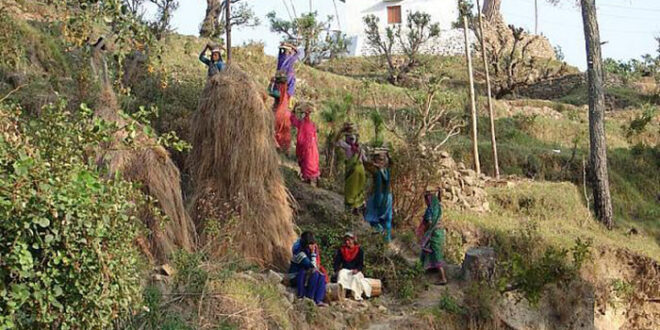Inspiration to write this article was drawn from the Ministry of External Affairs (MEA) briefing on ‘Operation Sindoor’ where Foreign Secretary of India Mr Vikram Misri was flanked by the Defence Spokespersons Colonel Sofiya Quraishi and Wing Commander Vyomika Singh. Moreover a picture of recent meeting headed by the district magistrate (DM) of Dehradun district Savin Bansal where a sizeable number of women officers were sitting in his vicinity, also motivated to analyze the state of women empowerment in Uttarakhand.
According to 2011 census 49.06% of total population 1,00,86,292 i.e. 49.48,519 were women, which is almost half of total population. Our women were actively involved in environmental and social movements though their lives mostly revolve around fuel, fodder and water. As far as literacy is concerned, women literacy was 70.70% against the 88.33% literacy of men.
Realizing the importance of women empowerment for overall growth, Mr Narayan Dutt Tiwari led Uttarakhand Government on 24 July 2006 issued a Government Order to give 30% horizontal reservation to women domiciled in the state which was 20% earlier. This decision was challenged in the Uttarakhand High Court by the 16 women from Uttar Pradesh and Haryana and this order was stayed by the Court. Subsequently Dhami Government moved the Supreme Court and vacated the stay order. The Dhami Government tabled Uttarakhand Public services (Horizontal reservation for Women) Bill 2022 on 29 November 2022 in the state assembly to provide 30% domicile based reservation to women in government jobs which was passed by the assembly and ultimately signed by the Govrnor Lieutenant General (retd.) Gurmit Singh on 10 January 2023 and it became an act ultimately. The manner with which govenments took interest across the party lines shows their sincerity for the cause of women empowerment.
As far as women leadership is concerned, the Mrs Rekha Arya as the Sports Minister was leading from the front in successfully organizing the 38th National Games in Uttarakhand first time ever. First woman Chief Secretary Mrs Radha Raturi successfully completed her extended tenure before being finally superannuated. The cushion of 30% reservation is an actual motivating factor for women to work hard for joining civil services and other government services in Uttarakhand. It’s really visible all around.
With the financial assistance, training programmes and mentorship, a surge in women entrepreneurs have been witnessed especially in the areas such as agriculture, handicrafts, tourism and more. Mudra Yojana provides loans to micro and small businesses including those owned by women with loan amounts ranging from Rs 50,000 to Rs 10 lakh. Similarly Stand-Up India provides opportunities to women entrepreneurs from Scheduled Caste (SC) and Scheduled Tribes (ST) communities.
As far as key women centric schemes in Uttarakhand is concerned, there is Nanda-Gauri Yojana that provides financial assistance to girl children, encouraging their education and preventing female feticide. There is a provision of one- time payment at birth and upon completion of higher education. Mukhyamantri Mahila Poshan Yojana focuses on maternal health and nutrition, providing nutritious food supplements to pregnant and lactating women. Janani Shishu Suraksha Karyakram (JSSK) aims to improve maternal and child healthcare by providing access to safe delivery services in government facilities. Uttarakhand Mahila Samekit Vikas Yojana works on issues such as workload reduction, skill development and economic opportunities. Swadhar Scheme provides support and rehabilitation to women in distress, offering shelter, counselling along with legal and medical assistance. Goat rearing Scheme provides financial assistance to women for goat rearing so that they can establish small-scale livestock units and become self- sufficient. Pradhan Mantri Ujjwala Yojana (PMUY), a national scheme provides free gas connection and subsidized cylinders in view of facilitating women with cleaner cooking practices. It’s a fact that major cause of respiratory problems in rural women is the use of woods and dung in the traditional ‘chulhas’. Kasturba Gandhi Balika Vidyalaya (KGBV) Scheme provides free and quality education to girls aged 11 to 18 in residential schools.
In 2011 census, the women to men sex ratio in Uttarakhand was 963 per thousand which was higher than 940 women per thousand men in the country. Fifth National Family Health Survey (NFHS-V) released in 2021, the sex ratio stood at 984 women per thousand men. However, according to Niti Ayog’s Sustainable Development Goals Index published in June 2021, Uttarakhand was placed lowest with sex ratio of 840 which was countered by Uttarakhand government alleging that its own survey showed the figure as 949. As per estimation for 2025 out of 1, 17, 000, 99 population of the state, women population is estimated as 56, 39, 784 i.e. 48.20% and sex ratio is estimated to be 952-954. It shows a dip from the 2011 perspective. We expect to get a clear picture with 2025-2026 censsus for sure.
Unfortunately the lower strata of population sees girl child as a burden due to insecurities and dowry problem and in general try to get rid of it before or after birth. Our house help had to borrow huge sum for getting her daughter married and she has two more daughters to get married in due course. Look at their plight and with no sense of family planning they take the alternative recourse of either female feticide or abandoning them post birth and suffer life- long with unending debt. With strong enforcement of Pre-Conception and Pre-natal Diagnostic Techniques (PCPNDT) Act, sex determination and termination cases have seen a dip and Diagnostic Centres have also been alerted as stringent actions were taken against the violators. The national scheme Beti Bachao Beti Padhao (BBBP) implemented in Uttarakhand, aims to improve the child sex ratio and empower girls through education and awareness.
I believe in the adage “The hand that rocks the cradle, rules the world”. Strict implementation and monitoring of government schemes that are sufficient in number for a noble cause of women empowerment will really help curb the skewed sex ratio and will uplift the overall status of women for the good cause of society in the end. Author being father of a daughter strongly advocates for sensitizing and educating masses towards the importance of women in the society as empowerment of the weaker section will not only benefit the individual households, will add to the economic and social upbringing of the state too.
Dr Prashant Thapliyal
Academician
 National Warta News
National Warta News




